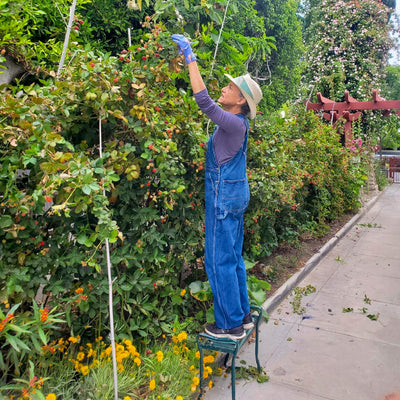Dirty Collabs: Amy Aquino, Actress and Sustainability Champion


Amy harvesting blackberries for her annual Alzheimer's fundraise, 2021
I’m not Greta Thunberg. I’m an actress – and I’m not even vegan, for Pete’s sake. But, like her, I see the impact of daily individual choices on the climate crisis that’s now all too real. .
I was raised by parents whose childhood poverty, coupled with imagination and ingenuity, taught them how to have a great life with less waste. “Reduce, reuse, recycle” wasn’t some mantra for them – it was an imperative. Cloth towels did the job in the kitchen, and when they were too worn they became cleaning rags. The empty bleach bottle got cut in half and became a funnel, with a handle. When an appliance broke, we fixed it, and when something got soiled, we cleaned it and kept using it. It wasn’t hard, it saved money, and took no more time than buying it new. And while reducing waste wasn’t the goal – well, it did that too.
I’m also old enough to have grown up in a world before ubiquitous single-use plastic. If you were thirsty, you got water from the faucet, or a water fountain. Soap came in a bar wrapped in paper, and milk was, at first, delivered in a glass bottle that would get reused, and then sold in a waxed cardboard container. Yogurt was in cardboard too, with a thin foil top, and orange juice concentrate came frozen in cardboard. Dishwasher and laundry detergent came in cardboard boxes, oils and vinegar were in glass. And toothpaste was in an aluminum tube.
Gradually, all of that compostable and reuseable packaging was replaced by plastic, and single-use items like paper towels and wipes became the norm. Like everyone else in America, I got used to it. Until it became clear that this non-recycled plastic and other waste was, literally and figuratively, burying us and our future.
So I hid the paper towels inside a cupboard, and stocked up on cloth. I switched to recycled TP and biodegradable dish-washing liquid, grew herbs in pots and the garden, used veggie scraps for stock, loaded my compost bin, went back to bar soaps and found earth-friendly laundry detergents that don't come in huge plastic jugs. And my carbon footprint, and my expenses, plummeted, while my quality of life actually improved.
Now virtually everyone is feeling the effects of the climate crisis. Two-thirds of Americans believe that it’s harming future generations, and the same number believe that individuals should do something about it.* They just don’t know how.
The fact is, as Americans we literally don’t see how our habits and lifestyle contribute to making us the country with the largest per capita carbon footprint in the world – by far.
My degree in Biology from Harvard helps me understand the underlying issues, and nearly 40 years onscreen has made me recognizable to a lot of people, both as funny and as authoritative. (I probably hold the record of playing more judges and doctors than any other actor.) My goal, at this point in my life, is to use my public persona to do what I can to raise consciousness about the impact of our lifestyle on the climate, and to demonstrate– with humor and without judgment - what we can do to be a part of the solution.
We can’t all be Greta Thunberg, but if millions of us just take baby steps to a greener lifestyle, we can actually help save our planet.
* Yale Climate Opinion Maps 20
Read more

Plastic-free and the road to a sustainable future.
Plastic pollution is evident everywhere, from the deepest ocean trench to the remote corners of ...

10/09/23 Ask Dr. Pete
Meet Dr. Pete: An Interview with Our Chief Scientist
As a product inventor, innovator, and sustainability expert, he’s the brains behind our Bio Laun...
